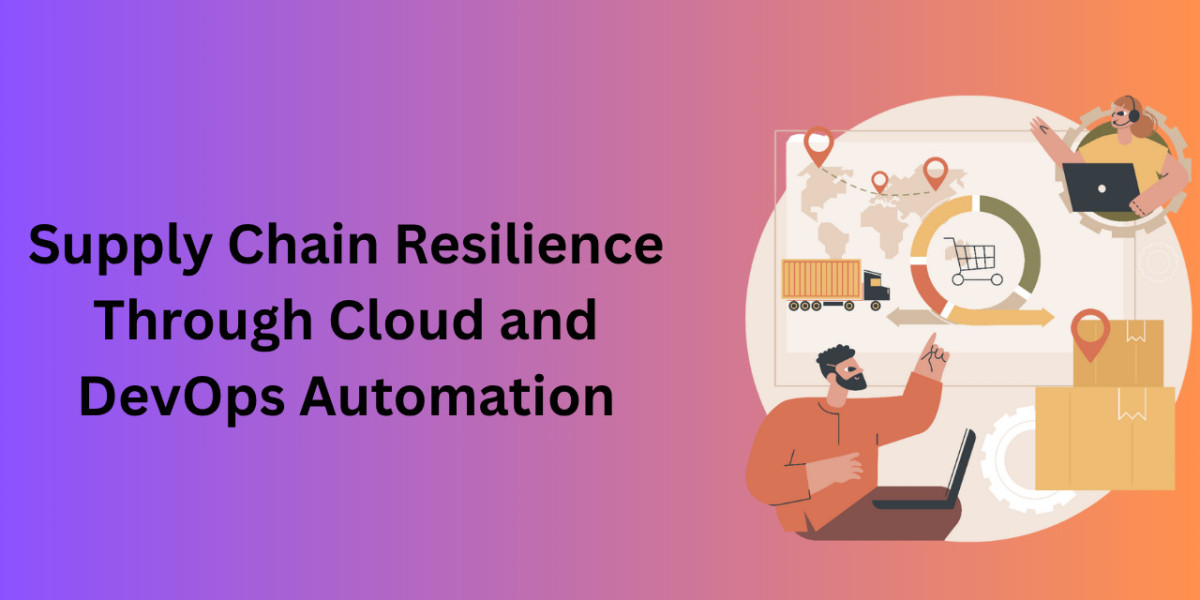In today’s highly interconnected world, supply chains face increasing pressure from disruptions such as global pandemics, geopolitical conflicts, rising customer expectations, and rapid digital transformation. To maintain agility and minimize risks, organizations are turning to advanced digital strategies. Among these, implementing a cloud and DevOps consulting service has emerged as a cornerstone for building resilience, ensuring scalability, and enabling real-time collaboration across supply networks.
Cloud and DevOps, when applied together, go beyond traditional IT modernization. They empower enterprises with automation, agility, and continuous delivery capabilities that directly support supply chain operations. From improving visibility to reducing downtime, these technologies ensure that businesses can adapt quickly to change and continue to deliver value to customers without interruptions.
Understanding Supply Chain Resilience in the Digital Age
Supply chain resilience refers to the ability of an organization to anticipate, respond to, and recover from unexpected disruptions while maintaining operational continuity. Traditional supply chain models relied heavily on manual processes, siloed systems, and delayed decision-making, which left organizations vulnerable to sudden shocks.
With digital transformation, resilience has taken a new dimension. Modern supply chains demand:
End-to-End Visibility – Real-time data sharing across suppliers, logistics partners, and distributors.
Automation – Minimizing human error and accelerating repetitive processes.
Scalability – Rapidly adjusting capacity to meet demand fluctuations.
Risk Management – Identifying vulnerabilities early through predictive analytics.
Sustainability – Ensuring long-term adaptability without compromising compliance or efficiency.
Cloud and DevOps together provide the foundation for achieving these outcomes by bringing IT and operational workflows closer, eliminating silos, and enabling seamless collaboration.
How Cloud Transforms Supply Chain Operations
Cloud adoption in supply chains allows enterprises to operate on a global scale without being restricted by physical infrastructure. Key transformations include:
Data Centralization – Cloud platforms consolidate supplier, logistics, and customer data into a unified ecosystem.
Scalability on Demand – Cloud elasticity ensures resources can expand or contract as supply needs shift.
Cost Efficiency – Pay-as-you-go models reduce the burden of heavy infrastructure investment.
Global Collaboration – Suppliers and partners access shared platforms securely, enabling real-time updates.
Faster Innovation – Cloud-native tools accelerate the deployment of advanced analytics, IoT, and AI-driven applications.
By leveraging cloud technology, enterprises reduce inefficiencies and gain the agility needed to respond quickly to disruptions.
The Role of DevOps in Supply Chain Automation
DevOps extends cloud capabilities by bridging development and operations, ensuring continuous delivery and innovation. In supply chain contexts, DevOps provides:
Continuous Integration & Continuous Deployment (CI/CD): Faster rollout of supply chain applications with minimal downtime.
Infrastructure as Code (IaC): Automated configuration of servers, networks, and applications to standardize deployments.
Monitoring & Observability: Real-time visibility into system performance, supplier interactions, and logistics workflows.
Automated Testing & Security: Reducing risk by validating code, integrations, and security compliance at every stage.
Agile Collaboration: Breaking silos between IT teams and supply chain managers for faster decision-making.
Together, DevOps practices enable businesses to automate mission-critical processes while ensuring that supply chain operations remain reliable, secure, and scalable.
Cloud and DevOps Automation in Action
Organizations that integrate cloud and DevOps automation in their supply chains benefit from measurable improvements:
Reduced Downtime: Automated failover and self-healing systems keep applications running.
Proactive Risk Detection: Predictive analytics anticipate disruptions such as delays or shortages.
Enhanced Supplier Collaboration: Centralized platforms improve trust and information accuracy.
Real-Time Adaptability: Systems can instantly adapt to demand surges, such as during peak retail seasons.
Compliance Assurance: Automated security checks ensure regional and industry-specific compliance.
This shift transforms supply chains from reactive structures into proactive, future-ready ecosystems.
Integration with Supply Chain Management Software
In modern enterprises, cloud and DevOps automation do not function in isolation—they work seamlessly with supply chain management software. These platforms bring advanced capabilities such as predictive analytics, inventory optimization, and AI-driven insights.
By integrating DevOps pipelines with SCM systems, organizations achieve:
Unified Data Flow: Consistency across procurement, inventory, and logistics.
Accelerated Feature Updates: Faster deployment of SCM enhancements without downtime.
End-to-End Visibility: Real-time dashboards monitoring supplier performance, demand forecasting, and logistics efficiency.
Automation of Manual Tasks: Eliminating paperwork and manual approvals in procurement workflows.
This synergy between DevOps and SCM ensures that organizations can respond faster to disruptions, optimize resources, and improve customer satisfaction.
Security and Compliance in Automated Supply Chains
Supply chain disruptions are not limited to logistics—cybersecurity threats can cripple global operations. With sensitive supplier, partner, and customer data being exchanged across digital platforms, robust security measures are essential. Cloud and DevOps strategies support this through:
Zero-Trust Architectures: Every access request is authenticated and authorized.
Data Encryption: End-to-end encryption ensures data security during transfer and storage.
Role-Based Access Control (RBAC): Limits user permissions to reduce insider risks.
Automated Compliance Audits: Continuous monitoring ensures adherence to standards like GDPR, HIPAA, or ISO 27001.
Disaster Recovery & Backup Automation: Protecting supply chain continuity during system failures or cyberattacks.
When embedded properly, these measures provide both operational continuity and regulatory confidence.
Business Benefits of Cloud & DevOps Automation in Supply Chains
Organizations implementing these strategies enjoy significant benefits:
Agility: Rapid adaptation to market shifts or supply chain disruptions.
Efficiency: Lower operational costs due to automation and cloud scalability.
Reliability: High uptime and system availability even during peak loads.
Speed to Market: Faster delivery of goods and services thanks to streamlined workflows.
Innovation: Cloud-native tools and DevOps pipelines support advanced analytics and AI capabilities.
Ultimately, these benefits translate into stronger customer trust, improved supplier relationships, and a resilient business ecosystem.
Future Outlook: The Evolution of Supply Chain Resilience
The future of supply chain resilience will be shaped by technological innovation. Key trends include:
AI & Machine Learning: Smarter demand forecasting and risk management.
IoT Integration: Real-time tracking of goods and assets throughout the supply chain.
Blockchain Adoption: Improved transparency and trust across multi-tier supplier networks.
Edge Computing: Bringing computational power closer to physical supply chain nodes for faster decision-making.
Sustainable Practices: Leveraging automation to reduce waste, emissions, and inefficiencies.
As these technologies converge with cloud and DevOps practices, supply chains will evolve into more intelligent, adaptive, and future-proof systems.
Conclusion
The modern dynamic supply chain landscape demands not just incremental improvements to be made when it comes to building resilience. It requires comprehensive change to automation, real time visibility and secure and scalable infrastructure. Using the synergistic strengths of cloud platforms and DevOps automation, companies can turn their supply chains into dynamically agile and proactive ecosystems that can survive even in times of disruption.
Any business that undertakes this trip places itself not only in a better place to survive in the face of uncertainty but also in the future of international trade.






